You might have noticed, it’s been a bit quiet around here lately. Well, for the last 6 months or so anyway. Something really BIG has taken up my time. For the best part of two years really… The biggest creative project of my life. I’ve been working with sound since the late 1980s, and working in radio most of my life – from the early days at 3RRR, to triple j, then on ABC Local Radio and Radio National too. Radio’s always been my “first love”. When I relocate to Berlin in 2015 as a freelance media maker (and as a newly-minted meditation teacher!) I add “podcast maker” to my suite of skills. It seems a “no brainer”. Helping set up…

Stories from inside life’s big top.
Posts from the “berlin” Category
Watching Kriv Stenders’ film about The Go-Betweens made me homesick. Hearing ‘Cattle and Cane’ killed me. It’d been a while. Only music can do that. Bang! That forlorn bass-line wrapped itself around my heart and squeezed out a river of tears. From the depths. From a lifetime ago. Nostalgia had come calling. Sometimes it’s nice to be reminded of where you’re from, especially if you’ve given over swathes of your life to leaving it behind. I’ve come to know that a sense of ‘home’ is necessary. Especially when you’re living oceans apart. Viewing the film in Berlin, Germany – my home for not much longer now – it also stirred a deep sense of yearning. For the lush tropics of northern…
Berlin is no stranger to ‘cross-cultural exchange’. An historical “hub” between Eastern and Western Europe, immigrants have been steadily arriving for over 800 years. You could say the city was built on it. Something former mayor Klaus Wowereit was supremely aware of when in 2003 he proudly proclaimed the German capital “poor but sexy” to the entire world. Perhaps ‘crass’ in the eyes of some, “Wowi” was not only hoping to encourage economic immigrants (ie big business, tech start ups and the eventual “roamer workforce”) to set up shop and part with their cash in his “impoverished” city. Simultaneously he renewed and acknowledged Berlin’s longstanding historic commitment to welcoming cultural and creative migrants as well. Artists, performers, thinkers, writers, poets,…
History is littered with creative siblings, often in music, sometimes in film, occasionally in literature… See the Sisters Bronte and Arquette; the Brothers Grimm and Gibb; the Coen Brothers, Baldwins, Wachowskis and Gershwins; soft-pop super-duo The Carpenters, hard-rock guitar heroes Malcolm and Angus. The families Corr, Barrymore, Boyd and Mora. Then there are my personal faves, Ann and Nancy Wilson from Heart. Seventies AM rock would have been nothing without these sisters, nor their songs Barracuda and Crazy On You. Nothing. It’s come time to add a pair of visual artist sisters to the list: Lucy Dyson and Molly Dyson. Both are from Australia. Both live in Berlin. And both are starting to leave their mark in a serious way. …
The last time I interviewed Yuendemu-based musician Jeremy Conlon, he was about to release Return To The Big Eyes. His ninth as Cooperblack – the “plug n’ play” personal music project he began in the 90s – EP ‘Big Eyes (2015) was an intimate journey through fat bass lines, intensely danceable beats and a relationship that had not long fallen through the ice… Two years on, while the prolific musician, producer and composer’s heart has healed somewhat, his sense of reflection and musical exploration is as open and raw as ever. 2017 sees him back with No. 10, Capsule, a darker, sparser offering influenced as much by a second sojourn to Berlin as the soundscapes he discovered walking the icy climes…
Tagged: berlin, capsule, cooperblack, depeche mode, finland, jeremy conlon, music
One of the most impressive things about Cedric Till is the respect that he has for words. About to turn 28, the Berlin-born rapper and spoken word artist stills rowdy rooms with the power of his poetic expression. You know something special’s about to happen when he gets up on a stage, quietly smouldering with the intensity of not only having something to say, but having thought through how to say it a thousand times over… Up there, he lights a fire, digging deep into the machinations of his experience and fashioning carefully-chosen phrases into rhyme, rhythm and reason. No-one draws a breath until he finishes his gentle speak-singing narratives, usually flashing a wry, shy grin in conclusion. In “a world…
Tagged: berlin, cedric till, concrete cee, hip hop, ice-t, iron fist in a velvet glove, lagari, rap
I’ve always been fond of ‘goo’. It’s the name of my favorite Sonic Youth album. It’s one of my favorite words, caught somewhere between “coo” and “gum”. And ‘goo’ has always been one of my favorite things to eat, especially if it’s coloured pastel pink. Growing up in the 70s I consumed my fair share, especially ‘Junket‘, one of my mother’s specialties. It would arrive as ‘sweets’ at dinner parties, often on the heels of pineapple ham steaks or chicken chow mein. It was the gelatinous, wobbly version of musk sticks, fridge-set, in tall curvy glasses on stems. A sugar coma in the making, us kids couldn’t get enough of it. All these years later and on the other side…
Tagged: art, berlin, künstlerhaus benthanien, lyndal walker, photography
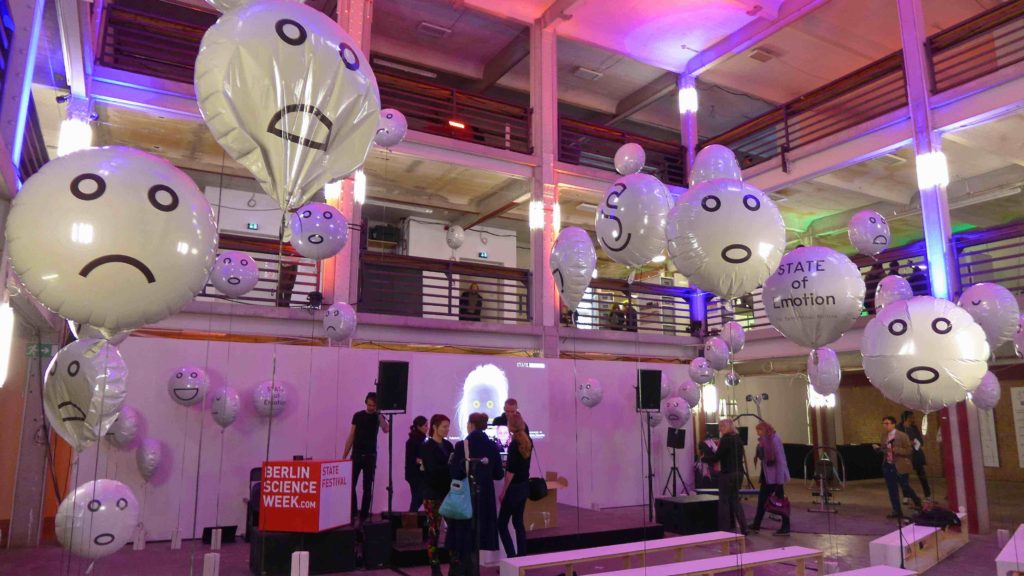
State Festival 2016, at Külhaus, Berlin. Photo: Megan Spencer (c) 2016
In November I had the good fortune to attend STATE Festival, a festival for “Open Science, Art and Society” at Kühlhaus, Berlin.
When Berlin turns on a good festival, you really feel it. I had the same range of happy emotions and visceral engagement coursing through my body at spectacular sound festivus Berlin Atonal in 2015.
Now in its second year, the theme for this year’s STATE was “Emotion: The Sentimental Machine.” Scientists, researchers, artists, makers, musicians and thinkers from Germany and beyond contributed to what was an incredibly exciting and progressive program, split into several strands: a two-day conference (where research papers were shared), public talks, interactive art installations, workshops, films, and an extensive pre-program of pop-up labs and workshops, where inter-disciplinary collaborators were brought together to work on various projects, some with seriously fascinating implications for society and culture.
The opening night “Warm Up” event manifested as A Night At The Museum, with the main room of Berlin’s famed Naturkundmuseum (“Natural History Museum”) opening to festival guests and the public.
Wandering among the interactive installations, beautifully displayed fossils and spectacularly lit dinosaurs, I half expected the prehistoric beasts to come to life in a ‘ta-daa’ moment of event-appropriate surprise. Once the jungle-esque soundscape by DJ Grizzly subsided, key note speeches began. We listened to STATE’s founder Dr. Christian Rauch, (a physicist with a PhD in nanoscience and excellent taste in electronica), the museum’s Head of Science Programme & Public Engagement Dr. Katrin Vohland and primate research scientist Dr. Katja Liebal, who gave a glimpse into her animal emotions research project with primates.
The night set the tone for what was an incredibly exuberant, optimistic and progressive few days: the festival celebrates not only science but its intersections and cross-pollination with other modalities and disciplines – namely the arts, philosophy, medicine and design. Oh – and the public.
“Affective research” was high on the agenda with a number of conference panels devoted to the neuroscience behind affect and empathy. Creative research methods were also advocated – including communicating findings via storytelling and creating “narratives” around data. Open source science and “citizen science” were also embraced, with Katrin Vohland openly declaring Naturkundmuseum’s advocacy for public involvement in scientific “deliberation” during her opening night speech. Word was out: the scientific community needs to change tack if it’s going to be relevant in – and make an impact on – today’s “post truth” society.
“Emotions seem to play an increasing role in science and science communication,” she said in her speech. “Scientists have to pack their results into stories. Some researchers already talk about the post-factual era we are entering, opening the room for populism and manipulation.”
Could science be letting go of its long-held aversion towards ‘affect’? Is “subjectivity the new black”? Listening to the STATE 2016 discourse, the answer is a resounding ‘yes’.
As we poked around the exhibits opening night, it felt like a dance party for curious people, observing, listening and discussing in unadulterated awe and wonder. It was nice to feel that way again – like delighted, curious children discovering the world for the first time.
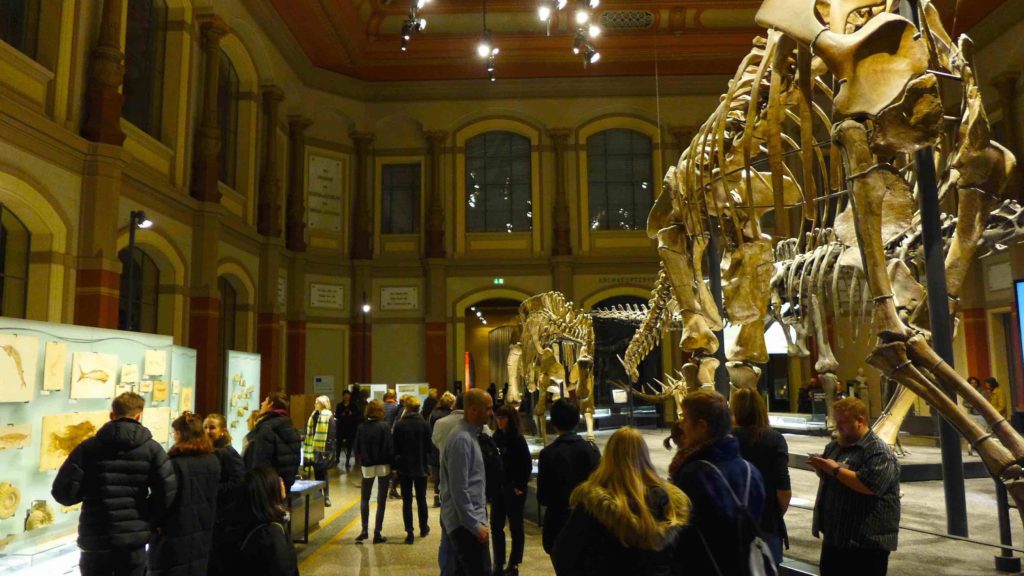
Walking with dinosaurs at STATE Festival Opening Night. Photo: Megan Spencer (c) 2016
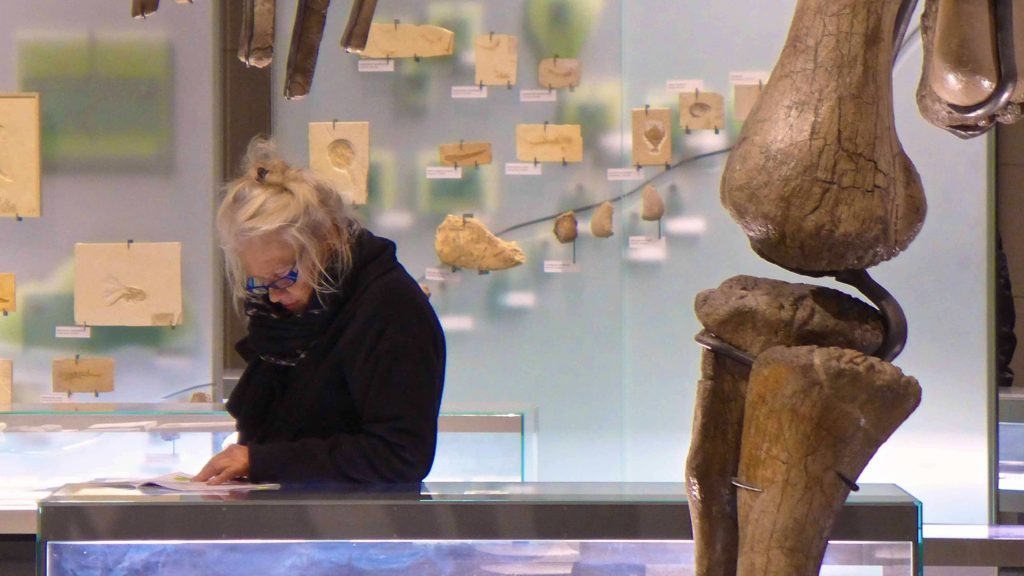
‘Dem bones’. Opening night at Naturkundmuseum, STATE Festival 2016. Photo: Megan Spencer (c) 2016
One of the projects that piqued my curiosity was ‘Digesting The Anthropocene‘, devised by American “experimental philosopher” and conceptual artist, Jonathan Keats. Namely as it made manifest the link between mind and body, and the capacity we have for intelligence using our senses (an embodied experience of knowledge, as opposed to purely a cognitive one.) It is based around his theory of “gastronification”, what he calls “an alternative tool for visualising big data”.
“Data gastronification is where we might engage the emotional cognition of people’s stomachs and intestines in getting a better understanding of “wicked” problems involving a huge number of different data sets and influencing factors, such as for example, in anthropogenic (human influenced) climate change.”
“Instead of visualizing model projections for processing by the visual cortex and brain, Keats’ method makes the data ‘fit for consumption’, literally: flow diagrams are reformulated as recipes, which can be cooked up and digested. Different scenarios and conditions will now be represented in culinary terms.” (Description from STATE catalogue.)
His local collaborators were David Marx, founder of Berlin food lab Science Kitchen; scientific researchers at Berlin’s Futuruim Project, and designer and data visualization specialist Stefan Thiel. The team worked with Keats in an attempt to make the science around climate change “digestible” for the general public, coming up with a recipe for ‘climate change sorbet’ based on three flavour profiles:
- Green = low greenhouse gas emissions.
- Blue = medium C02 emissions, and
- Turquoise = high fossil fuel emissions.
The hope being (from my interpretation of it anyway), to create a more inclusive public conversation around the problem of climate change – ie a deeper, less fraught engagement with the problem based on intuitive perception – so that taking action might become a reality rather than a political football.
To, as it were, create a solution through shared ‘gut feeling’.
It’s a very exciting idea, especially as the scientific evidence around mind/body medicine continues to grow, and the bias against ‘affect’, subjectivity and emotion within the scientific world, diminishes. Listen to my full interview with Jonathon Keats at the audio link below.
Other highlights from my STATE Festival experience:
- Listening to the research findings of Cornell University emotions researchers Dr. Adam Anderson and Dr. Eve de Rosa in their work around using feelings or “affect” as valid measures of perception;
- Dr . Helen Stark’s paper about the “History of Emotion'” and “The Man Of Feeling” in the Romantic period of literature (Queen Mary University of London);
- Receiving an immersive sound and touch massage from “sensation composer” Jacques-André Dupont and instrument designer/music composer Clément Destephen, as part of their MIM installation (“The Medium Is The Massage”). It was so beautiful I was moved to tears, and
- Seeing Werner Herzog’s documentary about the digital age, ‘Lo And Behold: Reveries of the Connected World.’ Sad, funny, frightening, and vintage Herzog.
* * *
And my festival rating? Big happy face emoji : )
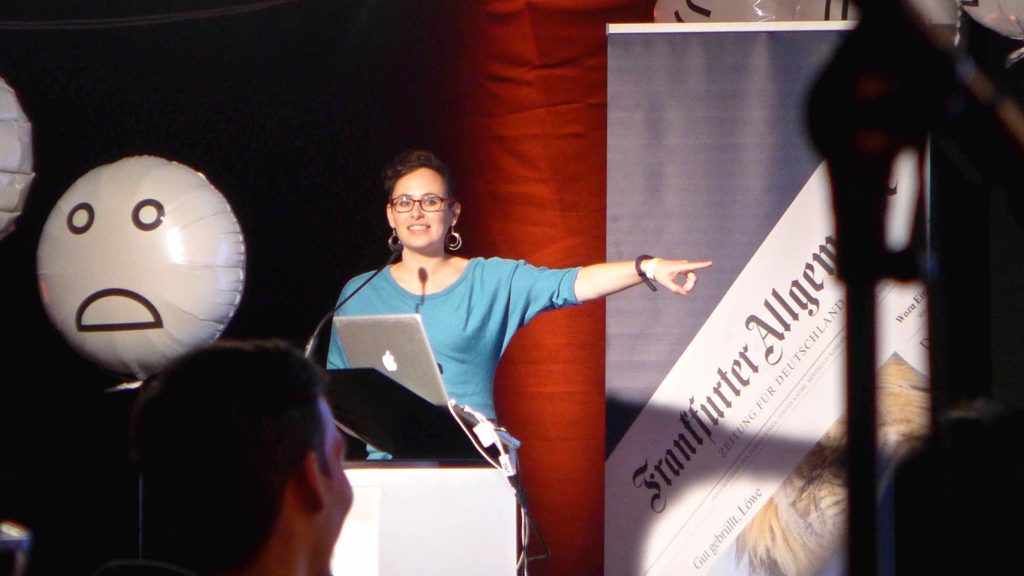
Woman of feeling: Dr. Helen Stark, delivering her paper about ‘The Man of Feeling’ in the history of Romantic Literature. Photo: Megan Spencer (c) 2016
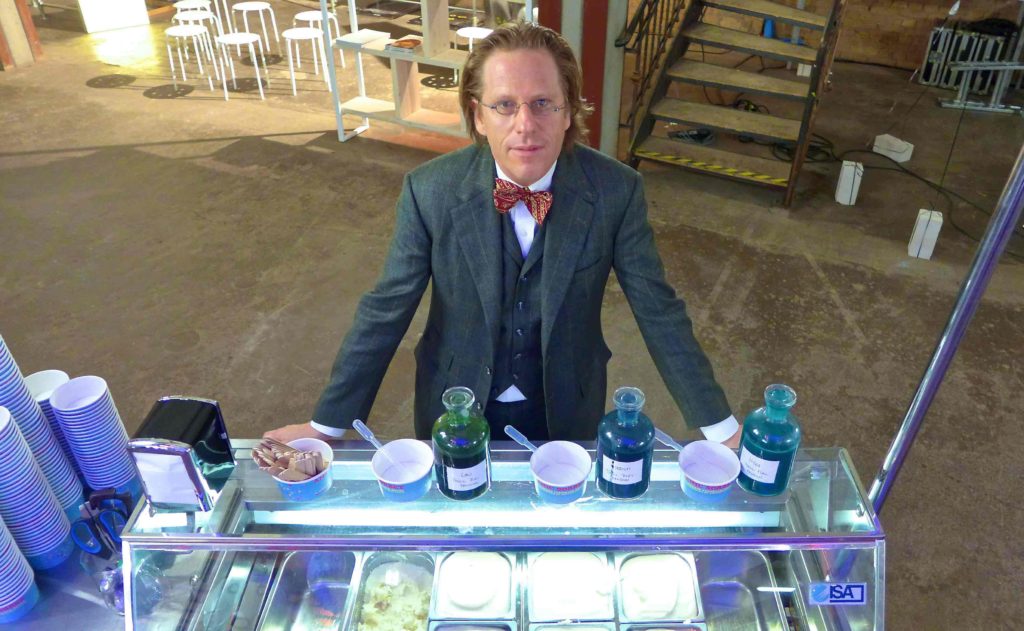
Digesting climate change: Jonathon Keats at STATE Festival, 2016. Photo: Megan Spencer (c) 2016
* * *
Words, images and sound (c) Megan Spencer 2016.
- Discover: the STATE Festival program
- View: my STATE Festival photo album
- Eat: the Climate Change Sorbet photo album
- Listen: to my STATE Festival report on Radio National
- Hear: the entire Jonathan Keats interview on Soundcloud
- Visit: STATE Festival on Facebook
Many thanks to the STATE Festival team for support, and to Jonathon Keats for the interview.
When I watch ‘Vaginal Knitting’, the video of Casey Jenkins’ performance installation Casting Off My Womb, I see a powerful, graceful figure at work. With her beatific smile, the artist looks like some kind of angel as she sits there, back perfectly straight, quietly going about the business of knitting, using wool she has buried deep inside her vagina… The yarn hanging above her is so pearly white it shimmers: the only thing that’s missing from this picture is a pair of wings. Wings that in my opinion belong to a bit of a superhero… A simulacrum of historic portraiture also erupts from this moment of looking: centuries cascade across the image. It becomes a critical reflection on the historic act…
You could say that Tatyana Krimgold is the perfect Wahlberliner… A writer, singer, acoustic musician, electronic music maker, yoga teacher, event producer and occasional stand up comedian, Tatyana is one of those adventurous ‘creatures’ for which Western Europe’s “poor but sexy” artist colony is so famous. Its eclectic, creative ‘bio-dome’ atmosphere has been attracting artists for well over a century, with no sign of letting up in spite of looming takeover bids by opportunistic entrepreneurs and residential gentrification. As a musician, part of Tatyana’s creative practice is to allow herself to dare greatly: to move outside of her comfort zone whilst applying the “structures” she’s studied and learned across the years. Unafraid to play, discover and experiment with her music, she also…
Tagged: berlin music, dance, electropunk, krimgold, tatyana krimgold